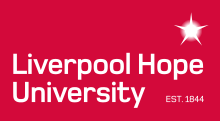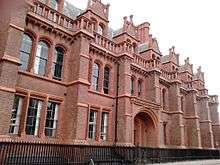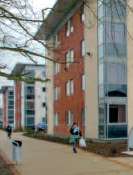Liverpool Hope University
 | |
Former names | Notre Dame College, S. Katharine's College, Christs' College, Liverpool Institute of Higher Education; Liverpool Hope University College |
|---|---|
| Motto | In Faith, Hope and Love[1] |
| Type | Public |
| Established |
1844 - teacher training college 2005 - Gained full university status |
| Endowment | £0.11 m (2015)[2] |
| Chancellor | Charles Guthrie, Baron Guthrie of Craigiebank |
| Vice-Chancellor | Gerald J. Pillay |
| Students | 5,550 (2014/15)[3] |
| Undergraduates | 3,920 (2014/15)[3] |
| Postgraduates | 1,630 (2014/15)[3] |
Other students | 20 FE[4] |
| Location | Liverpool, England |
| Campus | Hope Park, Childwall & The Creative Campus, City Centre |
| Colours | |
| Website |
www |
Liverpool Hope University is a public university in Liverpool, England. As the only ecumenical university in Europe its work has been shaped by Christian principles but embraces those of all faiths and none.[5] The university comprises three faculties – Arts and Humanities, Education, and Science – organised into 19 departments.[6]
The university has two campuses, the main Hope Park campus is located in the suburb of Childwall and the second campus, The Creative Campus, is located in Everton, close to the city centre.
History
Founding colleges
Two of the university's founding colleges, S. Katharine's (1844) and Notre Dame (1856) were established in the 19th century. These colleges were in Warrington and Liverpool City Centre respectively. These were among the first to provide opportunities for higher education to women. They were supplemented on Merseyside when a second Catholic teacher education college, Christ's College, on a site adjacent to St. Katharine's, admitted its first students in 1964. (Christ's was the first Catholic co-educational teachers' training college in England.)
In 1980, these three colleges joined in an ecumenical federation under the holding title of Liverpool Institute of Higher Education (LIHE). Archbishop Derek Worlock and Bishop David Sheppard wrote of this as being "a sign of hope".
Unification of colleges
In 1995, a new Instrument and Articles of Government established a single, unified, ecumenical College, and a new name: Liverpool Hope. A company limited by guarantee and registered as a charity was formed.
Meanwhile, expansion followed in both the range of degrees and in student numbers. The status of a fully accredited institution of the University of Liverpool had been achieved in 1994. This gave full responsibility to the college for the quality and standards of its course provision and provided recognition of its academic standing.
In 1998, the Accreditation Agreement with the University of Liverpool was renewed for five years and extended to cover taught postgraduate awards. After extensive scrutiny by the Quality Assurance Agency in 2001 and 2002, Liverpool Hope gained taught degree awarding powers in August 2002.
University status
The college made an application to become a university which was submitted in September 2004. The Privy Council approved the title "Liverpool Hope University" in July 2005, granting full university status under the leadership of Gerald J. Pillay, who is now the university's Vice-Chancellor & Rector. On 25 January 2006, Baroness Cox, Deputy Speaker of the House of Lords, was installed as the university's Foundation Chancellor. On 16 July 2013, The Lord Guthrie of Craigiebank was installed as the university's second Chancellor.
In September 2007 work was completed on the student services building, named the 'Gateway to Hope'. The building draws together all of the university's student services such as Registry, Accommodation Offices and the newly launched Student Success Zone.
In January 2009 work began on a new £7.5m Centre for Music, Performance and Innovation at the Hope's Cornerstone campus. The centre was officially opened in March 2010.
In March 2009, the university awarded Vasily Petrenko, Chief Conductor of the Royal Liverpool Philharmonic Orchestra, an honorary doctorate and made him a Visiting Professor of Music.
The university's £8.5m Eden Building on the university's Hope Park campus opened in October 2010. The centre consists of a lecture theatre, meeting space, offices and seminar and teaching rooms grouped around an internal street atrium.
In 2010 the Creative Campus was completed with the opening of The Capstone, a new Music Teaching building and performance venue which includes the Hope Theatre concert hall and Angel Field, a new garden with an outdoor performance area.
Campuses

The main campus, Hope Park, is located in Childwall and the second campus, The Creative Campus, is located in Everton.
The Sheppard-Worlock Library
The Sheppard-Worlock Library is the university's central library, based at the Hope Park campus. Housed within the Hilda Constance Building, the library offers extended hours throughout the year, including periods of 24-hour opening.
The Library takes its name from Bishop David Sheppard and Archbishop Derek Worlock. The two men were noted for their work in healing sectarian divisions within Liverpool during the 1970s and 80s. In addition, they shared the ambition for an ecumenical foundation in Liverpool Hope.
On a historic visit to London, Archbishop Derek Worlock and Bishop David Sheppard secured from the Secretary of State for Education permission to create an ecumenical institute of higher education. The story goes that the minister of state for further and higher education, Gordon Oakes (who was MP for the nearby constituency of Widnes), was not particularly concerned about the constitution of the new institute as he believed it would not last a year.
In 1997, one of the final acts of Jim Burke as Rector was to approve the building of a new library at a cost of £5.34million – the Sheppard-Worlock library which opened in 1997.
It is a member of the Libraries Together: Liverpool Learning Partnership (evolved from Liverpool Libraries Group) which formed in 1990. Under which, a registered reader at any of the member libraries can have access rights to the other libraries within the partnership.[7][8]
In addition to a wealth of publications, research material, extensive computing facilities and stationery sales, the library also plays host to a number of commercial activities in the business and education communities. The library also houses a number of research collections. These include:
- The Gradwell Collection: This collection, entrusted to Liverpool Hope on the closure of St. Joseph's College at Upholland, contains material covering the following subjects: theology, philosophy, church, secular and local history, ecclesiastical history, art, architecture, sociology, education and works of general reference. It also includes recusant works and early printed works.
- The Picton Collection: A collection of theology material on long-term loan from the Liverpool City Library Collection. This collection contains many of the classic New Testament works published before 1975, some old but extremely useful linguistic studies including older Hebrew, Aramaic and Greek lexicons, and several sets of theological texts. The Gradwell and Picton collections not only enhance but compliment The Sheppard-Worlock's own collection of theology holdings, both lending and reference.
- Archbishop Stuart Blanch (1918–1994) Collection: Hope has been fortunate enough to receive materials from the estate of Archbishop Stuart Blanch, Baron Blanch. These include notes from his student days at Wycliffe Hall, Oxford and notes for sermons, lectures, talks and speeches made while Bishop of Liverpool (1960–1966) and Archbishop of York (1975–1983).
- Professor Andrew F. Walls Centre for the Study of African and Asian Christianity: Materials have been donated to create a library for the Centre for the Study of African Asian Christianity by Walls himself, University of Edinburgh (Centre for the Study of Christianity in the Non-Western World) and University of Aberdeen. The Library offers resources across a range of mission studies, its principal focus being Africa and the Asia-Pacific region. Since missions from the West have had a part in the African and Asian Christian story, the collection has substantial holdings on the history of mission, and on missionary activity in other parts of the world, as well as on mission theology and practice, other faiths, and the history of religions.
- Education Research Collection: A research collection of books, pamphlets and journals on education and related subjects has been donated by University of Liverpool. The collection contains 30,000 books and pamphlets. These contain books on all aspects of education, particularly from an historic viewpoint and with large sections on special education and religious education. There are also collections of bibliographies, Government publications, Government and other statistical publications, and annual reports of organisations connected with education; 400 journals, with strengths in learning difficulties and special education, educational psychology, and education overseas.
- The Centre for Millennialism Studies: The Centre for Millennialism Studies is focused on the study of contemporary manifestations of millennialism and apocalypticism; particularly the ‘afterlife' of apocalyptic texts and ideas within popular culture.
- The Josephine Butler collection: A small collection of materials has been received from the University of Liverpool on Josephine Butler and her work.
Halls of residence

University-owned accommodation is available on both campuses. At the main Hope Park campus, set in the landscaped gardens, there are:
- Wesley. Primarily for QTS and first year undergraduates.
- Newman. Taking its name from the eminent Catholic cardinal, Newman offers first year and masters accommodation.
- Teresa. The final hall recently added to the Hope Park campus with en-suite accommodation.
- Austin. located on the main campus offers mixed sex accommodation.
- Angela. offers single sex, female accommodation.
- St. Agnes & St. Margaret's. Situated in the older part of the university.
- St. Elphin's and St. Elthedreda. these halls are located in the older part of the university and are close to the central university library.
The Creative Campus is served by Gerard Manley Hopkins Hall. The university also has halls of residence at Aigburth.
Organisation and structure
The university's academic organisation is divided into three main faculties:
- The Faculty of Arts and Humanities This faculty includes Liverpool Hope Business School and the Departments of: Drama, Dance and Performance Studies; English; Fine and Applied Art; History and Politics; Law; Media and Communication; Music; Social Work, Care and Justice; Social Science; Theology, Philosophy and Religion at undergraduate and postgraduate levels.
- The Education Faculty includes all Initial Teacher Training programmes (BA QTS and PGCE), Disability Studies, Education Studies and Early Childhood Studies as well as a range of Foundation Degrees, Masters and CPD courses. There is a growing research culture within the Deanery. The January 2014 OFSTED report declared that 'several aspects of leadership and management are outstanding' and it also identified the distinctiveness of the 'Hope tutor' and 'Hope teacher'.[9]
- The Faculty of Science contains the Department of Mathematics and Computer Sciences, Department of Geography, Department of Psychology and the School of Health Sciences. There are a number of Masters programmes and areas of research strength. Masters programmes in Computer Science are very popular, particularly with international students.
Academic profile
| Complete[10] (2017, national) |
83 | |
|---|---|---|
| The Guardian[11] (2017, national) |
=79 | |
| Times/Sunday Times[12] (2017, national) |
49 | |
The university had 3,920 undergraduates and 1,630 postgraduate students in 2014/15.[3]
In May 2007, the university announced a partnership with Sun Yat-Sen University, Guangzhou, China. The partnership seeks research collaboration and the opportunity for students from both universities to participate in a two-year academic exchange programme. The university saw one of its students selected, from thousands, to participate in the DfES funded project.[13] The University also has partnership with Christ University, Bengaluru, India since 2005 to promote faculty and student exchange, and research collaboration.[14]
Student life
Students' Union
Students at the university are represented by Liverpool Hope Students' Union (LHSU). Although there are two campus sites (plus another residential site) for the university, the Students' Union offices are located in the Foyer in the Lecture Theatre Complex at the Hope Park Campus.
The current Sabbatical Officers are President Kira Cox, Vice President Welfare & Community Ayodele Akinrele and Vice President Education Pranay Raj Shakya who were all elected in March 2015 and took office on 1 July 2015[15]
The union is affiliated to the National Union of Students and sends two delegates to National Conference each year.
Students can represent themselves through the three Union Forums (students' open meetings) and also elect Part Time Officers (4 Liberation Officers, 2 Campus Reps, 3 Sections Reps) to specific positions in November of each academic year. The main representatives are the three Sabbatical Officers who work full-time to represent and support students. The election process is normally contested in March, with successful candidates assuming office in July.
LHSU opened a new advice service in June 2014; it provides free, independent, confidential and impartial advice to students on their rights and responsibilities. More opportunities to get involved with the University community were also been created through the establishment of 32 new societies, taking the number of student groups from 42 in 2014 to 74 in 2015.[16]
According to the 2015 National Student Survey (NSS) results, satisfaction with Liverpool Hope Students’ Union has increased to 68 percent, a 14 percent improvement in satisfaction from last year - making LHSU the 2nd most improved union nationally in terms of score and ranking.[17]
THIS Radio
The university also broadcasts its own student radio station, THIS Radio. THIS stands for The Hope Institute of Sound and is Liverpool Hope University’s brand new student radio station. They broadcast globally online at thisradio.co.uk and through the THIS Radio Smartphone App. The radio station broadcasts from studios at the main Hope Park campus, located with the media facilities by the Lecture Theatre Complex, opposite to the Student Services building The Gateway.[18]
In 2013, students felt that the previous station, Radio Hope, needed a makeover and enlisted the help of Visiting Professor, BBC Radio Merseyside’s Roger Phillips.
After securing funding, the rebranding process began and in early 2014 a competition to find a new name was launched. The result of the competition was The Hope Institute of Sound abbreviated to THIS Radio. A promo video featuring the XFactor Voiceover Man Peter Dickson and 75 name entries later… THIS Radio was born! THIS Radio was announced on-air during Radio Hope's return to the Student Radio Association National UK Student Radio Chart show, on 23 May 2014.
THIS Radio will launch in the new academic year, from October, packed with shows that reflect individual interests and music tastes, whilst also providing essential campus, local and student news.[19]
Notable alumni
.jpg)
- Malik Al Nasir, poet and author
- Diane Allahgreen, athlete, hurdles champion, double European gold medallist
- David Alton, Baron Alton of Liverpool,[20] politician, life peer
- Steve Brine, Member of Parliament for Winchester
- Heather Craney, actress
- Peter Kilfoyle, politician, former Member of Parliament for Liverpool Walton
- Colm McFadden, Gaelic footballer[21]
- Jenny Meadows, athlete
- Terry Molloy, actor known for his roles in Doctor Who and The Archers on Radio 4
- Paul Nuttall, UKIP MEP
- Stel Pavlou,[22] screenwriter and novelist
- Willy Russell,[23] playwright
- Mike Storey, (now Baron Storey) politician, former Leader of Liverpool City Council
- Mary Lu Zahalan, singer and actress
Although not an alumnus of the university, comedian and silent film actor Charlie Chaplin temporarily lived in Salisbury Street and was registered as a pupil at Saint Francis Xavier’s Jesuit Secondary and Elementary Schools (now part of the Creative Campus), asserts Liverpool local historian Ken Pye.[24]
Chancellors
- Caroline Cox, Baroness Cox, (25 January 2006 – 16 July 2013)
- The Lord Guthrie of Craigiebank (16 July 2013- )
References
- ↑ Taken from 1 Corinthians 13:13 – Koine Greek
- ↑ https://www.hope.ac.uk/media/liverpoolhope/contentassets/documents/finance/media,58886,en.pdf
- 1 2 3 4 "2014/15 Students by HE provider, level, mode and domicile" (XLSX). Higher Education Statistics Agency. Retrieved 19 January 2016.
- ↑ "Table 0a – All students by institution, mode of study, level of study, gender and domicile 2006/07" (Microsoft Excel spreadsheet). Higher Education Statistics Agency. Retrieved 10 April 2008.
- ↑ Hodges, Lucy (28 June 2007). "Liverpool Hope – Europe's only ecumenical university – is resisting the urge to expand". The Independent. London. Retrieved 8 August 2007.
- ↑ "Departments and Faculties". Retrieved 16 July 2015.
- ↑ "Liverpool Libraries Together". Retrieved 16 July 2015.
- ↑ "Mersey Libraries". Retrieved 16 July 2015.
- ↑ OFSTED January 2014 report: http://www.ofsted.gov.uk/inspection-reports/find-inspection-report/provider/ELS/70130
- ↑ "University League Table 2017". The Complete University Guide. Retrieved 25 April 2016.
- ↑ "University league tables 2017". The Guardian. 23 May 2013. Retrieved 23 May 2016.
- ↑ "The Times and Sunday Times University Good University Guide 2017". Times Newspapers. Retrieved 23 September 2016.
- ↑ Murphy, Liam (7 May 2007). "Study partnership set to welcome first students". Liverpool Daily Post. Retrieved 23 October 2011.
- ↑ "Partnerships". Retrieved 15 January 2016.
- ↑ "Liverpool Hope Students' Union". Retrieved 16 July 2015.
- ↑ "Student Union achieves best ever student satisfaction result". Retrieved 14 August 2015.
- ↑ "We've Got High Hopes!". Retrieved 12 August 2015.
- ↑ "THIS Radio - Liverpool Student Radio". Retrieved 16 July 2015.
- ↑ "What's THIS @ THIS Radio - Liverpool Student Radio". Retrieved 16 July 2015.
- ↑ About, davidalton.com, accessed 9 May 2007
- ↑ Foley, Alan (11 September 2012). "Forward thinking McFadden". Donegal Democrat. Retrieved 11 September 2012.
McFadden had studied for his Postgraduate Certificate in Education at Liverpool Hope University, taking a year out from football with Donegal to qualify as a maths teacher...
- ↑ "Stel Pavlou". Stel Pavlou. Retrieved 23 October 2011.
- ↑ Willy Russell, Queen's Theatre, Hornchurch
- ↑ "Charlie Chaplin". Liverpool Hope University. 25 March 2010. Retrieved 23 October 2011.
External links
| Wikimedia Commons has media related to Liverpool Hope University. |